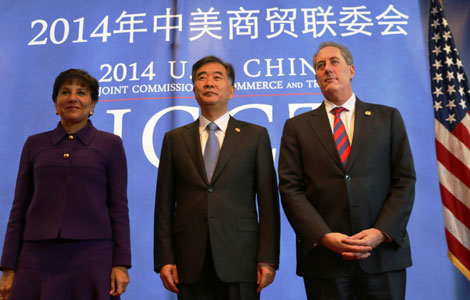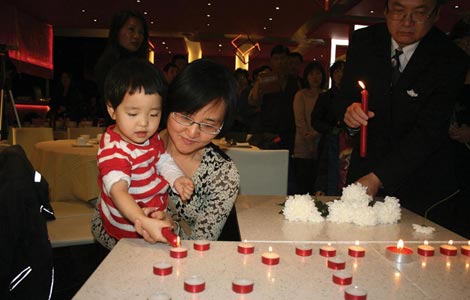Build, not break, a bridge for people
Updated: 2014-12-19 13:50
By Zhang Yue in Beijing(China Daily USA)
|
||||||||
A US congressional committee recently heard from critics of China's Confucius Institute program in the United States, who said the program is a form of propaganda by China, but Chinese teachers who have been through the program think it a fuss over nothing.
Early in December, a US congressional subcommittee heard from critics that some Confucius Institute programs in the United States work to project a positive image for China.
The Chicago Tribute reported that the University of Chicago severed its cooperation with the Confucius Institute this September. The university was reported as the first one to start cooperation with Hanban.
The university did not give a response to a media inquiry.
This summer, the American Association of University Professors urged universities in the United States to end their cooperation with Confucius institutes as they think there are too much academic control in language teaching, as the Chicago Tribute reports that "universities in the US are outsourcing academic control."
As the news reaches many Chinese who worked in the US as volunteer teachers in universities in the United States, or some other countries, many of them believe the US is making a big fuss of it.
Shen Hongdan, a lecturer in the department of International Chinese Language Education in Beijing's Language and Culture University, said she was extremely surprised to hear the news.
Shen worked as a Chinese teacher at the Asian Studies Center at the University of Illinois in 2011, as an exchange teacher.
"It's just ridiculous to separate the teaching of language and the introduction of your country's culture and history," she said. "In the class where I lectured in Illinois, the course was optional for all the university's students. Most students who chose to take the Chinese lesson have a very sharp interest in China, and they have good knowledge about China, but not comprehensive."
Shen said that many of her students major in economy, finance and international politics, where they have grabbed certain knowledge about China during their professional studies.
"Each of us would receive professional training before we work overseas as a Chinese teacher," Shen said. "Suggestions would be given during the training, but there is no such rule that there is any subject that we can not touch in class."
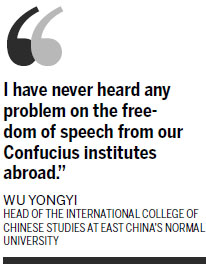
Once, an American student chose Mao Zedong as the topic of his class presentation.
"He was giving me a provocative look as if he was asking my permission for that," she said. "I smiled and said yes."
"Of course students are very interested in all the controversial undertakings that happened in China," she said. "And my attitude to this, as well as many other teachers, is to introduce the facts to the students. We seldom give judgment or comments on history. Students should have their own understanding."
There are 465 Confucius institutes in 123 countries around the world, according to Hanban. More than 100 of them are in the US.
"I don't know about other schools, but our university only establishes cooperation with universities that are willing to work with us," said Wu Yongyi, head of the International College of Chinese studies at East China's Normal University.
The university has so far established six Confucius institutes in the US by working with universities as well as local education authorities. In 2014, Wu's college has carried a new cooperation with Cleveland State University on giving long-distance doctoral lectures in international Chinese language education.
"I have never heard any problem on the freedom of speech from our Confucius institutes abroad," he said. "And we are now having more than 2, 000 foreign students at our campus each year. We are open to any topic discussion right here in our campus and they love to study with our Chinese students."
Zhao Yining, senior reporter at China's 21st Century Financial Report who has just published her new book on the two American political parties, said she thinks the criticism at the US hearing is not worth much concern.
"The Congress has hearings whenever there are certain critics, but personally I believe that the Confucius Institute serves as a good bridge for people from other countries to learn Chinese," she said. "At least I see a strong desire in learning Chinese during my stay in the US."
zhangyue@chinadaily.com.cn
Most Viewed
Editor's Picks
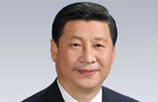
|

|

|
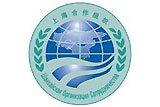
|

|
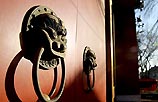
|
Today's Top News
China, US get things done at trade talks
JD.com adds Gap clothes online
California city fights 'birth tourism'
China OKs modified corn imports
Build, not break, a bridge for people
Chinese city shops for talent in Houston
Cleaner coal goal in deal by Houston firm
China niche for California design firm
US Weekly

|

|






